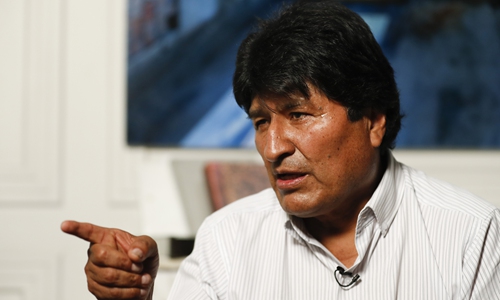HOME >> WORLD
Bolivia’s Congress authorizes new elections without Morales
Source:AFP Published: 2019/11/24 20:33:40

Former Bolivian president Evo Morales Photo: IC
Bolivia's Congress approved a bill on Saturday that opens the door to new elections without ex-president Evo Morales, as the caretaker government met with protesters to end weeks of unrest.At least 32 people have been killed in violence that erupted after a disputed election on October 20, with protesters' blockades causing severe fuel and food shortages in La Paz and other cities.
Both houses voted in favor of the proposal after hours-long sessions. It will be sent to interim President Jeanine Anez, who has already said she will sign the bill into law.
Among other things, the bill annuls the results of the October 20 vote and allows for new elections to be held.
Crucially, it bars candidates who served in both of the two previous terms from seeking reelection for the same position. That would prevent Morales from contesting the presidency in the new ballot.
Congress also needs to agree on a new seven-member electoral court, after members of the previous panel were removed for allegedly manipulating results.
The tribunal will be tasked with setting a date for the new vote that Anez has previously vowed to hold "as soon as possible."
"I want to thank our parliamentarians for having understood and listened to the demands of the Bolivian people," Anez tweeted.
New elections are seen as key to ending Bolivia's worst political upheaval in 16 years, which has deepened divisions between indigenous people loyal to Morales and Bolivia's mainly city-dwelling middle and upper classes.
Morales' Movement for Socialism (MAS) party holds a majority in both houses of Congress, but is divided over the left-wing leader and his political future.
While some supporters would remain loyal to Morales, members of his party "will try to save MAS without Evo Morales in order to be an option in the next elections," Carlos Toranzo, a political analyst, told AFP.
Morales, who had been seeking a fourth term, claimed he won last month's election, but opposition groups said the vote count was rigged.
An audit by the Washington-based Organization of American States found irregularities in the results.
Posted in: AMERICAS